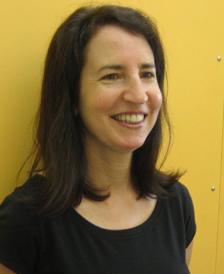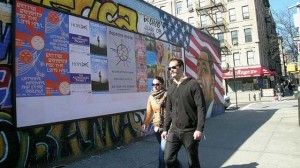The New York City-based Freelancers Union estimates that nearly a third of American workers are freelancers — about 42 million people. One of the common drawbacks of freelance work is the inability to organize for benefits like health insurance, retirement funds, overtime and sick days. In 2005, the Freelancers Union began offering health insurance to independent workers such as nannies, graphic designers, journalists and artists. They now have over 165,000 members across all 50 states. We asked Sara Horowitz, who founded the Freelancers Union in 1995, to talk about this new model for organizing workers and what it means for organized labor in general.
Theresa Riley: You’re the daughter of a labor lawyer and the granddaughter of the vice president of the International Ladies’ Garment Workers Union. What were you taught about unions growing up?
Sara Horowitz: My parents taught by example. In just talking about the topics of the day, it became clear to me that unions are a bedrock to make sure people have economic security – for individuals and for the larger economy. Having these family members showed me the union movement was something that could be your life’s work.
Riley: What do you think of the state of unions today? Why do you think the public is so hostile to unions and what can unions do to gain back their place in American life?
Horowitz: Unions have to evolve is to meet the needs of the changing workforce, where more people are working as freelancers, contractors, consultants. It’s much more of a gig economy. But all the laws and regulations that gave rise to today’s unions were written to fit a manufacturing economy. Just as mass production unions of the 1930s had to evolve from the craft union model of the 1860s, we have to come up with new kinds of models for this new workforce. Of course, each model sits side-by-side the other models, it doesn’t replace them.
Riley: Your organization estimates that nearly a third of American workers are now working independently — 42 million Americans — as freelancers. At the recent Personal Democracy Forum in NYC, you talked about how we’ve entered the third Industrial Revolution that some are calling the “collaborative economy” or “new mutualism.” What are some of the hallmarks of this collaborative era?
Sara Horowitz: What I really see developing is an entirely new economic model, one that weaves together companies, entrepreneurs, workers, and other organizations favoring long-term sustainability over short-term profit and shared power over top-down control.
Social enterprises, benefit corporations, credit unions, employee-owned businesses, and traditional cooperatives are on the rise, taking up a larger and larger share of the economy. The nation’s 30,000 co-ops alone produce $500 billion in annual revenue and employ more than 1,000,000 people. This is not a boutique movement.
What will truly bring these forces to scale, however, is if they learn one lesson from flourishing freelancers – your network is everything.
True success will come when these companies and organizations realize the power they have if they recycle their capital in each other – an agricultural cooperative in Iowa can hire an employee-owned graphic design firm in Brooklyn to build its website, then sell its wares to a CSA in Chicago, who got a loan for a new disbursement space from their local credit union. This creates a self-reinforcing loop of capital that brings control of the production-and-consumption cycle closer to those who it impacts most.
That’s why I call this model “new mutualism” – it’s where solidarity meets financial sustainability.
Riley: You started the union in order to provide freelancers with health care insurance. How much of what the Freelancers Union does today is about benefits and how much is about political action? Was there an evolution?
Horowitz: Nearly every conversation I had with freelancers when I first started Freelancers Union (then called Working Today) always came back to one main point – it was near-impossible to get health insurance as a freelancer. So, we started connecting people to lower-cost options. But that only went so far. We realized that if we started our own insurance company, we could provide even lower rates because we could help freelancers join together as a group. What we also realized is that if you have a sustainable business model, you can make sure the revenue from that company goes back to supporting the freelance community, a policy agenda and a vehicle for freelance networking.
Riley: Unlike traditional unions, independent workers who belong to the Freelancers Union have no collective bargaining power and no central company or industry to work within. Some have claimed that its not really a union. What do you say to those claims?
Horowitz: Freelancers Union is a union for the 21st century. The country’s modern conception of unions was formed in the industrial era, but there were workers’ groups – federations, guilds, alliances – long before collective bargaining units. The essence of a union is that it’s a place where workers can join together to solve their problems and take advantage of opportunities. There isn’t a democracy in the world without a union movement – and, in fact, the first thing dictators do is shut down the unions. I believe unions are going to evolve and include models like ours. We see ourselves as builders of innovative ways to make the economy stronger and more connected.
This Q&A was originally posted on July 6, 2012.



